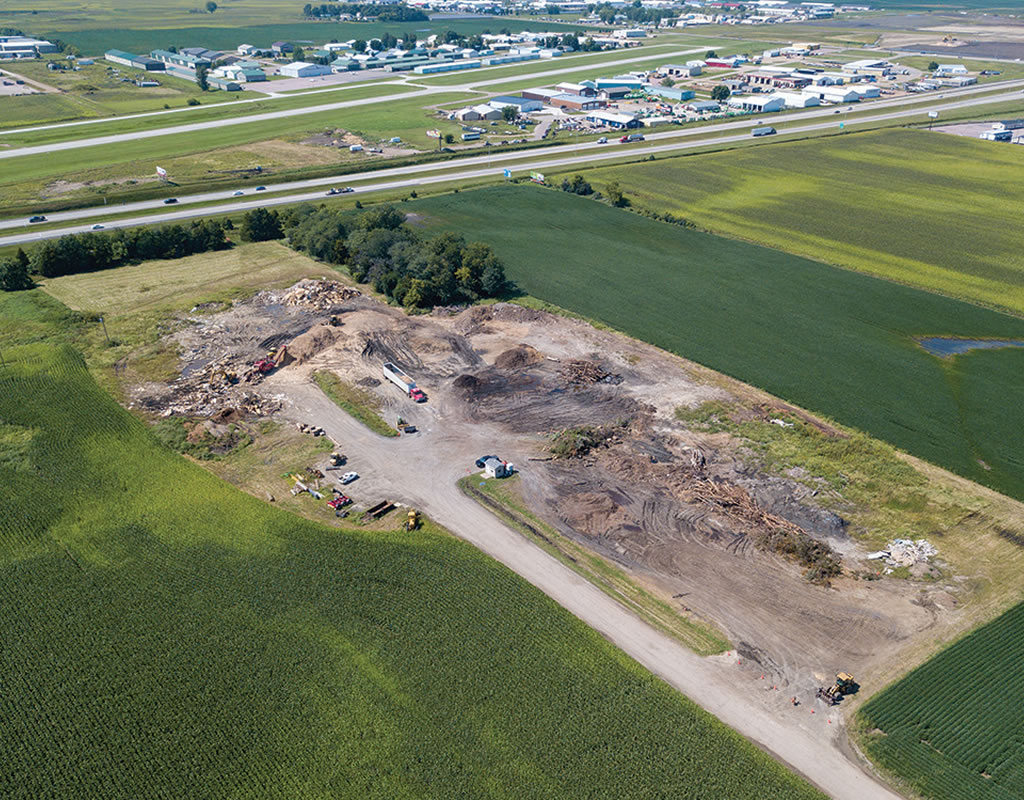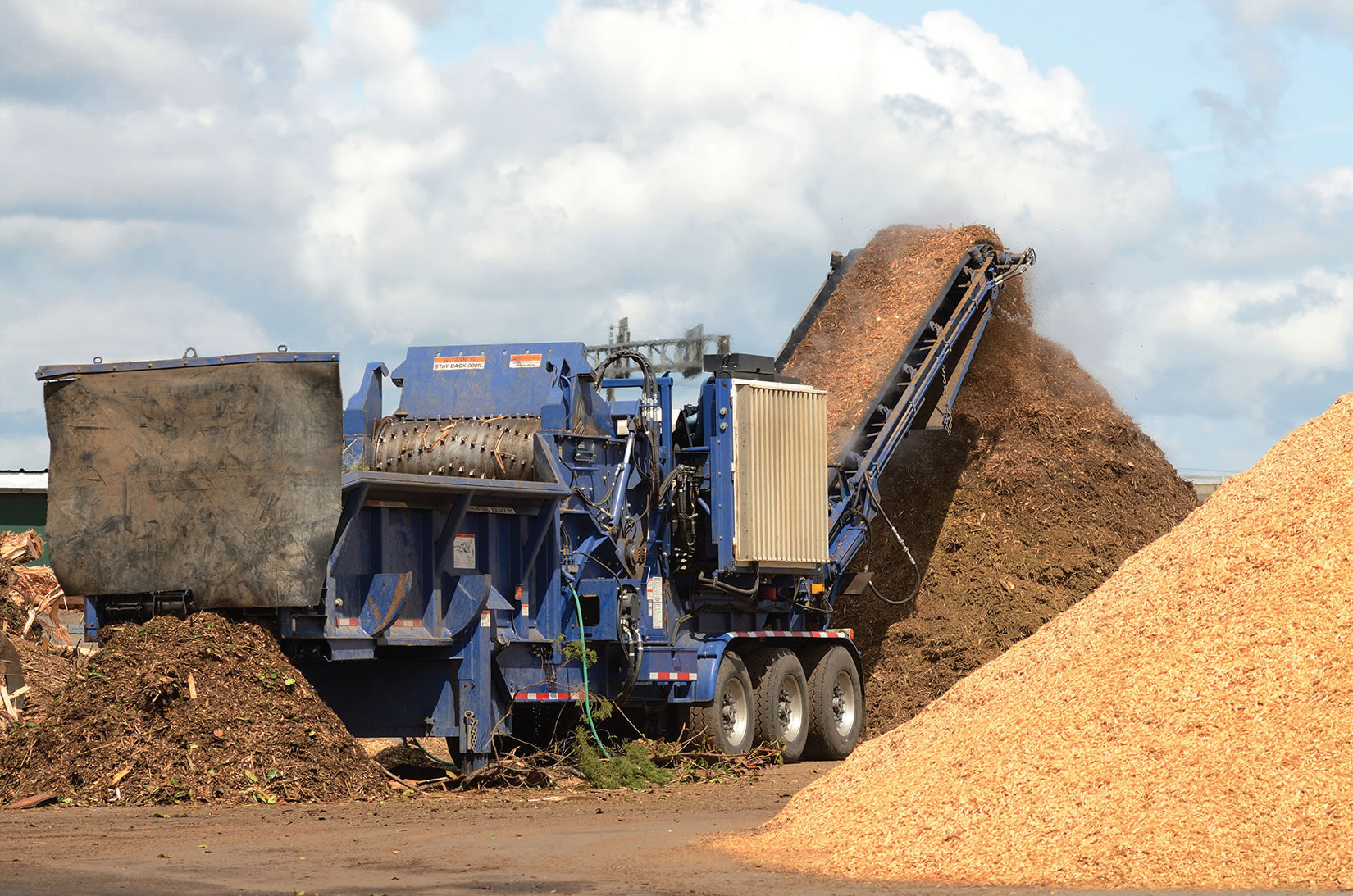By Ken McEntee
Following a weather-challenged 2018, mulch manufacturers in the Southern U.S. say 2019 has gotten off to a strong start. With better cooperation from the weather, most producers contacted by Soil & Mulch Producer News said they expect improved markets and increased production this year.
"Orders are coming in good and early," said Robert LaGasse, executive director of the Mulch & Soil Council (MSC). "It's an initial appearance of a good season."
Gina McLean, of Penick Organics, Macon, Miss., agreed.
"Sales are already strong and the weather hasn't really been that good," McLean said. "We're expecting strong sales to continue this year. We really didn't have a fall season. It was really hot, then it was cold and wet, and I think there is a lot of pent up demand because of that. We say in the south that when the temperature is over 90 degrees people don't put mulch out, and we had a really late hot season. We never had any cool, nice days in the fall."
Growth is in the bag
According to an industry survey conducted by Soil & Mulch Producer News in early February, many mulch manufacturers experienced significant reductions in bulk sales in 2018 compared to 2017. Poor weather was generally cited as the main reason.
Of the producers who responded, 44 percent reported higher bulk sales in 2018 compared to 2017; 38 percent said sales were lower and 18 percent reported that sales were about the same as in 2017. On average, respondents reported a 4 percent increase in bulk sales last year.
Sales of bagged products performed somewhat better. Fifty-eight percent of respondents said bagged product sales improved in 2018 compared to 2017, while only 17 percent said sales dropped. A quarter of the respondents reported flat sales. The average improvement among respondents was 6 percent.
Responding mulch manufacturers expect better sales this year than in 2018, with more optimism shown for bagged products than bulk. Of the survey participants, 47 percent said they anticipate better bulk product sales than last year, while 40 percent expect sales to be about the same. Only 13 percent anticipate reduced sales.
For bagged products, however, not a single respondent said that they anticipate lower sales. Almost two-thirds (64 percent) said they expect better sales of bagged products, while 36 percent expect sales to be about the same as last year.
"It will stay consistent just like the past several years," said Josh Posey, of Buckeye Resources Inc., Springfield, Ohio. "Bag products will go up and bulk will continue to go down."
Jenni Saucier, of Landscaper's Pride, Huntsville, Tex., said demand from growers for her company's bulk mulch has been strong, but movement to retail outlets has been slow.
"The season will start early and be very good for bagged products," Saucier said. "Our Potting Mix, Premium Rose Mix and Gardener's Magic are hot."
Jack Kemble, of Kemble Inc., Duluth, Minn., is counting on a strong mulch market to redefine his business, which has manufactured biomass fuel from landscape waste for 14 years.
"I'm on my way home from Kentucky, where I just picked up a new mulch colorant injection machine," Kemble said, while being interviewed for this article. "We're just getting into the mulch coloring business because they've closed most of the plants that burn biomass. The biomass market is done where I am. There is only one place left to bring it. We used to deliver nine semi loads a day and now we bring them 10 a year."
Kemble, who said he expects to start grinding in April, said he is optimistic about his prospects in the mulch business.
"I think it's going to be really good," he said. "People are landscaping more, so I think the market for natural mulch is going to be good, and in our area I am the closest producer in 100 miles. I just got a phone call today from somebody asking about new mulch sales. My product will go wholesale to nurseries and landscape supply companies, and I'll sell some direct to landscapers."
About 300 miles away, in Waupaca, Wisc., Eric Laszewski, of Waupaca Northwoods LLC, said, "Colored mulch continues to increase. There is no sign that this will stop."
On average, colored mulch accounted for 41 percent of the 2018 mulch sales for manufacturers who responded to the Soil & Mulch Producer News survey.
Trucking and margins pose challenges
Despite the overall optimism, the mulch business isn't without challenges, manufacturers said.
Matt Smith, of Smith Creek, Borden, Ind., said a wet weather and a shrinking margins are among those challenges.
"The price of mulch is not keeping up with the cost of producing it," Smith said. "The retailers are squeezing us on the price, while our costs of labor and trucking are going up. I don't have an answer for what we can do about it other than to just keep producing a better quality mulch."
Along with selling to retailers, Smith Creek also delivers its product to large landscapers.
LaGasse said low prices from national retail chains are a continuing problem for mulch producers.
"They understand the higher transportation costs the manufacturers are up against because they are one of the largest trucking companies in the country," LaGasse said. "But they don't want to pay the price (for mulch and soil products). They need our product lines to generate traffic in their stores so they can make a profit on the other materials, but they are going to take a baseball bat to us so they can keep selling five bags of mulch for $10."
Because the price of mulch keeps coming down, said Ervin Byler, of E-Pallet Inc., Middlefield, Ohio, "I think we'll be getting out of the mulch business after 2019."
Byler said mulch sales in 2018 were down 50 percent compared to 2017.
Meanwhile, said Pam Bee, of Bee Forest Products, Nelson, Wisc., the mulch market in her area is being flooded with "cheap mulch" produced by cities and pallet companies, making it difficult to market Bee's products.
The increased costs of trucking are impacting all businesses in the strong American economy. The soil and mulch business is no exception. Part of the problem is a shortage of drivers. Other problems include Hours of Service restrictions on drivers and the federally mandated use of Electronic Logging Devices (ELDs) which went into effect for interstate shipments last April.
"Shipping costs have really increased," McLean said. "I think that's going to effect everybody this year. I think the government is going to have to tweak the ELD rules. I think ELD works great for long haul truckers who don't load and unload during the day, but for people like us where our drivers are loading, going to the customer, unloading and coming back, the ELD system makes it hard and I think drivers are more tired. Before, drivers may have stopped to take a nap or a break, but now they feel like they can't do that, so I think the rule has had an opposite effect of what was intended. Freight costs are going up because it is taking more trucks to do the same amount during a day than it used to."
ELDs, which automatically monitor a driver's time in service, ensure that drivers can't exceed their allowable 14 hours of service and 11 hours of driving time. Under the federal rules, the time a driver waits to be loaded and unloaded counts toward his in-service time. Although the ELD mandate is for interstate truckers, individual states are expected to adopt similar regulations for intrastate trucking. Texas was the first state to issue an ELD requirement, with a compliance date of December 19, 2019.
Trucks carrying agricultural products during harvest season and stay within a 150-air-mile radius are exempt from the mandate. In December, the Federal Motor Carrier Safety Administration (FMCSA) denied a request from the Mulch and Soil Council to extend the agricultural commodities exemption to mulch and soil products, LaGasse said. He said about 60 percent of MSC members' shipments fall within the 150 air-mile radius. Under the exemption, the odometer - and hours of service wouldn't start spinning until a truck moves outside the 150-mile radius, LaGasse said.
"One hundred and fifty miles would give a driver almost an hour of loading time and a couple hours of driving time," he said. "That would be a distinct advantage in shipping."
Although MSC's request was denied by FMCSA, LaGasse said the council plans to join with other green industry organizations to petition the administration for an exemption.
"FMCSA that they were going to open a notice of proposed rulemaking to clarify the definition of agricultural commodities in January, but it was delayed by the government shutdown," he said. "We're waiting for them to publish a notice in the Federal Register so we can respond."
LaGasse added that Hours of Service rules are causing confusion throughout the trucking business.
"The state transportation inspectors are angry at FMSCA because they have issued more than 50 variances," LaGasse. "They're having a hard time enforcing the law because every time they turn around there is another variance issued. When you have to keep issuing variances, it demonstrates how bad the law is."
Drivers also are unhappy with the new regulations.
Announcing that the ELD mandate has “pushed them too far,” groups of truck drivers are threatening to shut down their engines on April 12. It’s unclear how many American truckers will participate in the trucker’s strike being called by such groups as Black Smoke Matters and Truckers Stand As One. According to Black Smoke Matters, which communicates primarily via Facebook, truckers are upset about the federal ELD mandate for interstate trucking, hours of service regulations, a lack of parking spaces and cybersecurity.
“Truck drivers have taken issue with many regulations that they are required to follow,” Black Smoke Matters posted on its Facebook page. “However, the electronic logging device has pushed the American truck drivers too far.”
That group and others, like ELD or Me and Operation Black and Blue said meetings with FMCSA failed to resolve their issues.
“The solution is to call for an industry-wide shutdown,” the group said. “This seems like a sensible idea because no one can force an individual to work. We, the American truck driver, have found that the FMCSA has made false claims in favor for regulations that force truck drivers of large commercial vehicles to use electronic logging devices and feel that is a common practice for the agency.”
The level of support for an April 12 shutdown among the nation's truck drivers is unclear.
"Revamping the trucking regulations will help our industry, but it's too late for this year," LaGasse said, noting that half of the industry's volume is shipped between March and May and 60 percent between March and June. "That's roughly 10,000 trucks a day we need, and we have to compete with all of the vegetable farms in the south. Getting the agricultural commodity exemption in time for next year's shipping season will help."
Industry optimism
Despite the challenges, with the majority of mulch producers surveyed expecting better markets this year, there are strong signs of optimism in the mulch industry.
"We're always optimistic," McLean said. "We love what we do and I think there is more interest in home gardens and landscaping. I think there is more interest today in people enjoying their spaces at home. So we're always excited about the future."
Ken McEntee is editor and publisher of Composting News (compostingnews.com).
Related News
Subscribe Today
Every other month, Soil & Mulch Producer
News brings you important stories about:
• New Technology
• Products
• Industry News
• Research Studies
Soil & Mulch Producer News features articles and services relevant to your daily operations.











